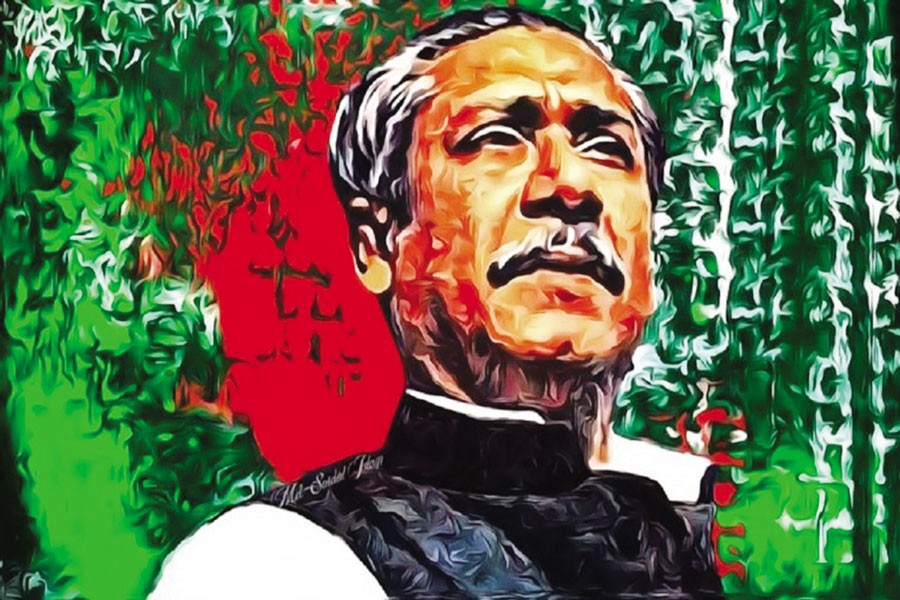
Published :
Updated :

Leader, legend, Bangabandhu--is any attribution really enough for him? Bangabandhu Sheikh Mujibur Rahman, the epitome of patriotism, the father of the nation, is a name inseparable from the name Bangladesh. The nation remembers him solemnly on his 101th birthday, just a few days before celebrating the nation's 50th birthday itself.
Indeed Bangabandhu acted as the architect of this independent nation. With pure passion, organising skills and winsome mentality, he became a great leader and established an extraordinary political image of himself. He knew his people well and loved them so much from his heart that he was always ready to do anything for them. During a famine in 1943, he distributed rice from his father's stockpile among the needy keeping his dad in the dark. It was perhaps the initial sign that he would go on to be a great leader, a people's leader.
His political career started when he met his idol Huseyn Shaheed Suhrawardy in 1938. He supported the agenda of the Muslim League and wanted a separate state for the Muslim people of the subcontinent. In 1947, after Pakistan was created, Bangladesh became a province of it known as East Pakistan. Since the creation, this region befriended sufferings, suppression and subjugation from its western counterpart. It all started when the West Pakistani despots wanted to impose Urdu as the only state language of Pakistan and protests flared among the mass people of East Pakistan. Sheikh Mujib was closely involved in those protests and was sent to jail by the Pakistani government. He was sentenced to jail 13 times on different occasions in his life, with the last time being on March 26 of 1971.
Just after the partition, Bangabandhu got enrolled at the Department of Law, University of Dhaka. During his studentship at the university, he founded the East Pakistan Muslim Students' League. He became an influential and esteemed student leader and led students to different protests. He even got himself expelled while protesting for fourth-grade workers' rights.
Sheikh Mujib left the Muslim League in order to join a new party named 'Awami Muslim League' as the joint secretary. This party was formed by Maulana Bhashani and Yar Mohammad Khan and is currently known as the Bangladesh Awami League. 'Muslim' from the name was left out after a few years to practice secularism. He even left the provincial cabinet formed by Awami League in order to devote himself to reorganising and strengthening the party and make it ready for something bigger. He gradually rose to the upper echelon of the party and started leading the people of this region towards independence.
The famous 'Six-point Demand' was placed by Sheikh Mujib in 1966 in which he asked for East Pakistan to be a fully autonomous province and a parliamentary democratic system for itself. The demands were later demonstrated as the 'Charter of Freedom.' Later, he was imprisoned again in 1969 for the 'Agartala Conspiracy Case,' which led to a mass uprising and the government was forced to let Sheikh Mujib out of jail. All these things gradually fueled anger among the people of East Pakistan and pushed them towards independence.
Awami League won the national election of Pakistan in 1970 by a large margin. But the West Pakistani autocrats were not willing to hand over the governing power to Sheikh Mujib and his party. This led to a non-cooperation movement against the Pakistani government under the leadership of Sheikh Mujib. And then on March 07, 1971, Bangabandhu delivered his world-famous speech which motivated the people of this country to a great extent. During his 19 minutes speech, he infused patriotic feelings into the people and also subtly conveyed the declaration of independence through his bold choice of words. Finally, on the night of the crackdown led by the Pakistani army, he was arrested and was sent to West Pakistan. But before that, he declared his beloved nation an independent one.
After independence, Bangabandhu returned to his homeland and took over the power. He started building a war-torn nation from the ground zero and was leading from the front. He also won the support he needed from other countries. He dreamed of turning Bangladesh into one of the greatest nations of the world. However, he could not finish what he started as he was brutally killed in his own house along with most of his family members on August 15, 1975. The day remains one of the saddest days in the nation's history.
This uncompromising and supremely principled leader will always be remembered by the people of this nation as they are enjoying freedom for the sacrifice he made. He will continue to inspire the youths and the elderly alike to love their country and work for its betterment.
The writer is a third year student of mass communication and journalism at Dhaka University.
Email: [email protected]


 For all latest news, follow The Financial Express Google News channel.
For all latest news, follow The Financial Express Google News channel.